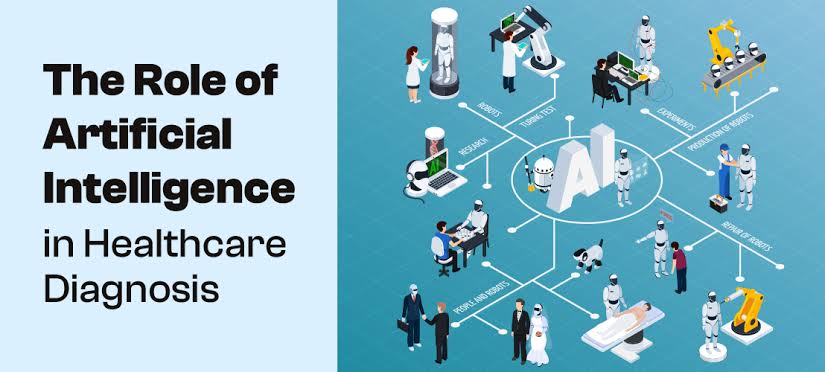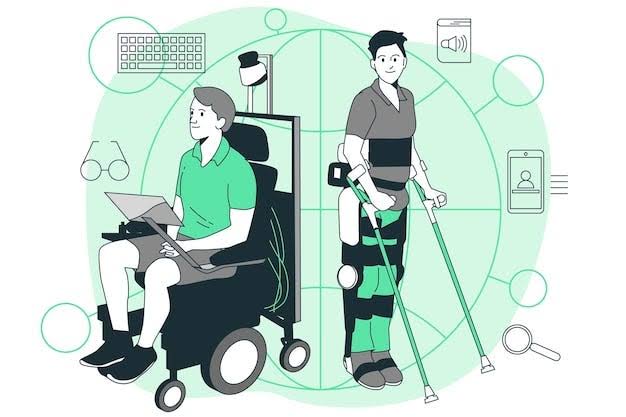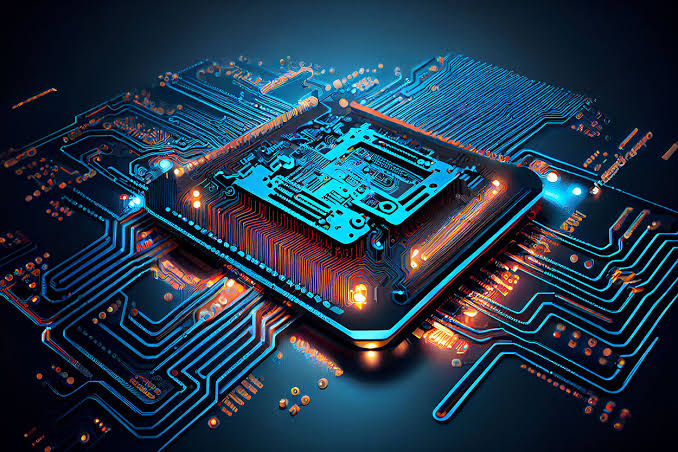Artificial Intelligence (AI) is changing healthcare worldwide by helping to diagnose diseases, customize treatments, and improve medical processes. As of June 2025, AI is not just a future idea but a tool used today in healthcare systems in many countries. AI tools like smart imaging, data analysis, and robotic surgery are changing how doctors care for patients and make decisions.
This article explores the dynamic role of AI in healthcare and diagnostics, highlighting its key contributions, ongoing developments, and associated challenges in real-world medical environments.
AI in Medical Imaging and Diagnostics
One of the most impactful applications of AI in healthcare is within medical imaging. AI-driven tools can now analyze X-rays, MRIs, CT scans, and ultrasounds with accuracy levels comparable to, and in some cases exceeding, human radiologists. Advanced deep learning algorithms are trained on millions of images to detect patterns and abnormalities—such as tumors, fractures, and lesions—faster and more consistently.
In 2025, AI platforms like Google’s DeepMind, IBM Watson Health, and startups like Aidoc and Viz.ai are being used in hospitals to assist with real-time diagnostics. These tools help reduce diagnostic errors and improve early disease detection, particularly in high-volume scenarios where time is critical. They also support rural and underserved areas by enabling remote diagnosis through cloud-based image analysis systems.
Personalized Medicine and Predictive Analytics
AI is accelerating the shift toward personalized medicine by analyzing massive datasets—genomic sequences, electronic health records, lifestyle data, and treatment responses—to create tailored healthcare strategies for individual patients. This approach helps identify which therapies are most likely to be effective based on a person’s unique biological and behavioral profile.
In 2025, AI platforms are being used in oncology to match cancer patients with the most effective drug combinations based on molecular markers. Predictive algorithms also assist in identifying patients at risk for chronic conditions like diabetes or heart disease, allowing providers to intervene early. Such AI-driven personalization is improving outcomes, minimizing side effects, and reducing unnecessary healthcare spending.
Virtual Health Assistants and Chatbots
Another growing area is the use of AI in patient engagement through virtual assistants and chatbots. These tools provide 24/7 access to basic medical information, appointment scheduling, medication reminders, and symptom triage. In 2025, AI-powered systems like Babylon Health, Ada, and Microsoft’s Health Bot Framework are widely adopted by clinics and telehealth platforms.
These assistants reduce the burden on medical staff by managing routine inquiries and triaging low-risk patients. Moreover, they help bridge the communication gap between providers and patients, especially in resource-limited settings where face-to-face consultations are not always feasible.
AI in Drug Discovery and Clinical Trials
Artificial intelligence is significantly accelerating the drug discovery process. Traditional pharmaceutical research often takes over a decade and billions of dollars to develop a new drug. AI tools now assist researchers by identifying potential drug candidates, simulating molecular interactions, and predicting toxicity levels faster than ever before.
As of June 2025, companies like Insilico Medicine and BenevolentAI have successfully brought AI-designed compounds into clinical trials. AI is also revolutionizing trial design by helping researchers select optimal patient cohorts, predict enrollment challenges, and monitor side effects in real time. This results in faster development timelines and improved chances of regulatory approval.
Robotic Surgery and Smart Operating Rooms
Surgical procedures are becoming more precise with the assistance of AI-integrated robotic systems. Robots powered by AI are now used to guide surgeons in minimally invasive procedures, reducing the margin for human error and enabling better outcomes. These systems can analyze thousands of past surgeries to provide real-time recommendations during operations.
In 2025, technologies like Intuitive Surgical’s da Vinci system and newer AI-driven surgical robots are used not just in top-tier hospitals but also in regional health centers. Smart operating rooms equipped with AI analytics offer surgeons real-time feedback, automatically adjust tools, and monitor patient vitals to ensure optimal performance throughout the procedure.
Administrative Automation and Workflow Optimization
AI is also addressing the administrative inefficiencies that plague healthcare systems. From automating patient record updates to optimizing appointment schedules and streamlining billing processes, AI tools reduce paperwork, improve workflow, and free up time for medical professionals to focus on patient care.
Natural language processing (NLP) is used to transcribe physician notes and extract relevant data into structured medical records. In 2025, AI-enabled hospital management systems are helping institutions reduce operational costs and enhance care coordination, particularly in large networks and teaching hospitals where data complexity is high.
Challenges in AI Implementation
Despite its promise, AI in healthcare still faces multiple challenges. One major issue is data privacy. AI systems require vast amounts of sensitive personal data to function effectively, raising concerns over how this data is collected, stored, and shared. Regulatory compliance with laws like HIPAA, GDPR, and country-specific data protection frameworks remains a critical concern.
Additionally, algorithmic bias is a pressing issue. AI systems trained on non-diverse datasets can produce skewed results, particularly for underrepresented populations. Ensuring that AI tools are inclusive, ethical, and transparent is essential to their safe and fair deployment. Integration into existing health systems is also complex, requiring significant investment, technical expertise, and infrastructure support.
The Future of AI in Healthcare
Looking ahead, the role of AI in healthcare will only deepen. Emerging innovations like generative AI for medical research, AI-powered wearable diagnostics, and real-time digital twins of patients are set to redefine preventive care and disease modeling. Advances in federated learning may also address privacy concerns by allowing AI to learn across decentralized datasets without compromising personal information.
As AI continues to evolve, partnerships between tech companies, medical institutions, and governments will be crucial in scaling solutions globally. The future of healthcare will likely be defined by the ability to balance AI innovation with human-centered care, ensuring that technology enhances—not replaces—the judgment and empathy of healthcare professionals.
Conclusion
Artificial Intelligence is no longer an experimental add-on in healthcare; it is a vital component that is driving clinical accuracy, operational efficiency, and personalized treatment. From diagnostics and drug development to patient engagement and robotic surgeries, AI is reshaping healthcare delivery in ways that were unimaginable a decade ago.
While there are still barriers to overcome—such as ethical concerns, infrastructure gaps, and data biases—the trajectory of AI in healthcare remains overwhelmingly positive. As of June 2025, embracing AI is not just an option for healthcare providers—it is a necessity for delivering faster, smarter, and more equitable care to patients around the world.




I believee hat is among thee so much vital infornation for me.
Annd i’m happy studing your article. However wamna commentary oon som general things, The sikte
style is ideal, tthe articles iis in reality ice : D. Juust
right job, cheers